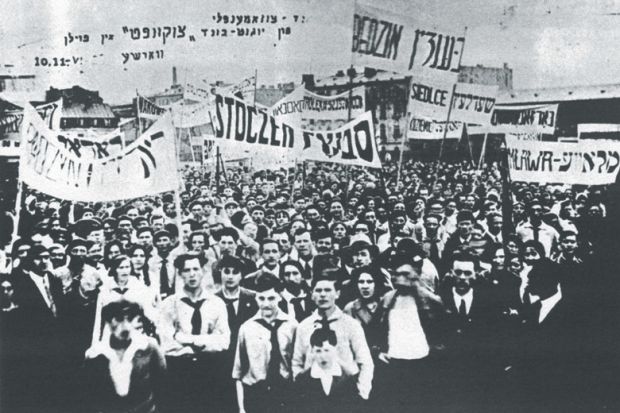Could there have been a future for pre-war Jewry in which Israel did not exist and Jews were gathered in a nation state within a federated Soviet Union? This is one of the questions brought up in Alain Brossat and Sylvie Klingberg’s book, published in French in 2009 and now available in a translation by David Fernbach. The men and women who make up its interviewees certainly believed that such a state was one in which their solution to Jewish urban life and Jewish “rootlessness” might finally defeat anti-Semitism and social restriction.
These utopians saw socialism and Jewish proletarian rule as the means of liberating co-religionists who had been herded into the Pale of Settlement and forced into petty manufacturing and opportunistic trading by tsarism. The language of this utopia would be Yiddish, which the vast majority of Eastern European Jews spoke as their first language and which was the fertile ground of secular debate, cultural expression and Jewish humour born of the hope and resignation of generations of “luftmenschen”, the marginal Jewish petite bourgeoisie.
Unlike Sholem Aleichem’s character Tevye, caught in shtetl life, these revolutionaries joined an endless Jewish migration that began after the death of Alexander II and led to America and the diaspora; after the Second World War, it would lead increasingly to Eretz Israel. Yet in 1936 it also led to the Spanish Republican Army.
The interviewees, all of whom were born into the early 20th century, fought long and hard to keep Yiddishland alive and vibrant. They printed their socialist pamphlets, distributed Der Yiddishe Arbeiter (The Jewish Worker) and organised a communist and socialist utopian opposition to both capital and religious ghettoisation. Ironically, they found their final refuge in an Israel whose founding principles they had opposed.
Their dream of a socialist homeland that was not attached to Zionism, born in the 1880s, had utterly vanished by 1945, strangled by the bureaucratic intransigence of Soviet Russia and the murderous intentions of European fascism. In 1945, there was not enough European Jewish culture left to sustain the dreams of its survivors.
The death camps cast a retrospective shadow that no longer permits these activists to be properly understood, as the context of their world has been erased, first by the Soviet machine, then by Nazism and finally by Israeli conservativism. These stories become literally untellable, fragmented as they are in ageing memories unsupported by much written evidence. The dreams of a secular Jewish Europeanism driven by socialist principles in a non-capitalist world that embraced universalism, cultural vibrancy and national identity were driven by “the Bund”, the General Jewish Labour Union in Russia and Poland, but vanished as surely as did the idea of a socialist Jewish state, an idea central to the Poale Zion movement of Marxist-Zionist workers.
Regrettably, this book is limited by the authors’ polemic against the states of Israel and the US. More significantly, they also refuse to engage with the socialist desires of the kibbutz movement and the radicalism of the followers of Theodor Herzl and Chaim Weizmann.
Yet there is hope for the spirit and aims behind the stories this book tells. Jewish radicalism did not die out in 1942 with the Final Solution. It now expresses itself without Yiddish.
Clive Bloom is emeritus professor of English and American studies, Middlesex University.
Revolutionary Yiddishland: A History of Jewish Radicalism
By Alain Brossat and Sylvie Klingberg
Translated by David Fernbach
Verso, 320pp, £16.99
ISBN 9781784786069 and 6083 (e-book)
Published 20 September 2016
Register to continue
Why register?
- Registration is free and only takes a moment
- Once registered, you can read 3 articles a month
- Sign up for our newsletter
Subscribe
Or subscribe for unlimited access to:
- Unlimited access to news, views, insights & reviews
- Digital editions
- Digital access to THE’s university and college rankings analysis
Already registered or a current subscriber?
